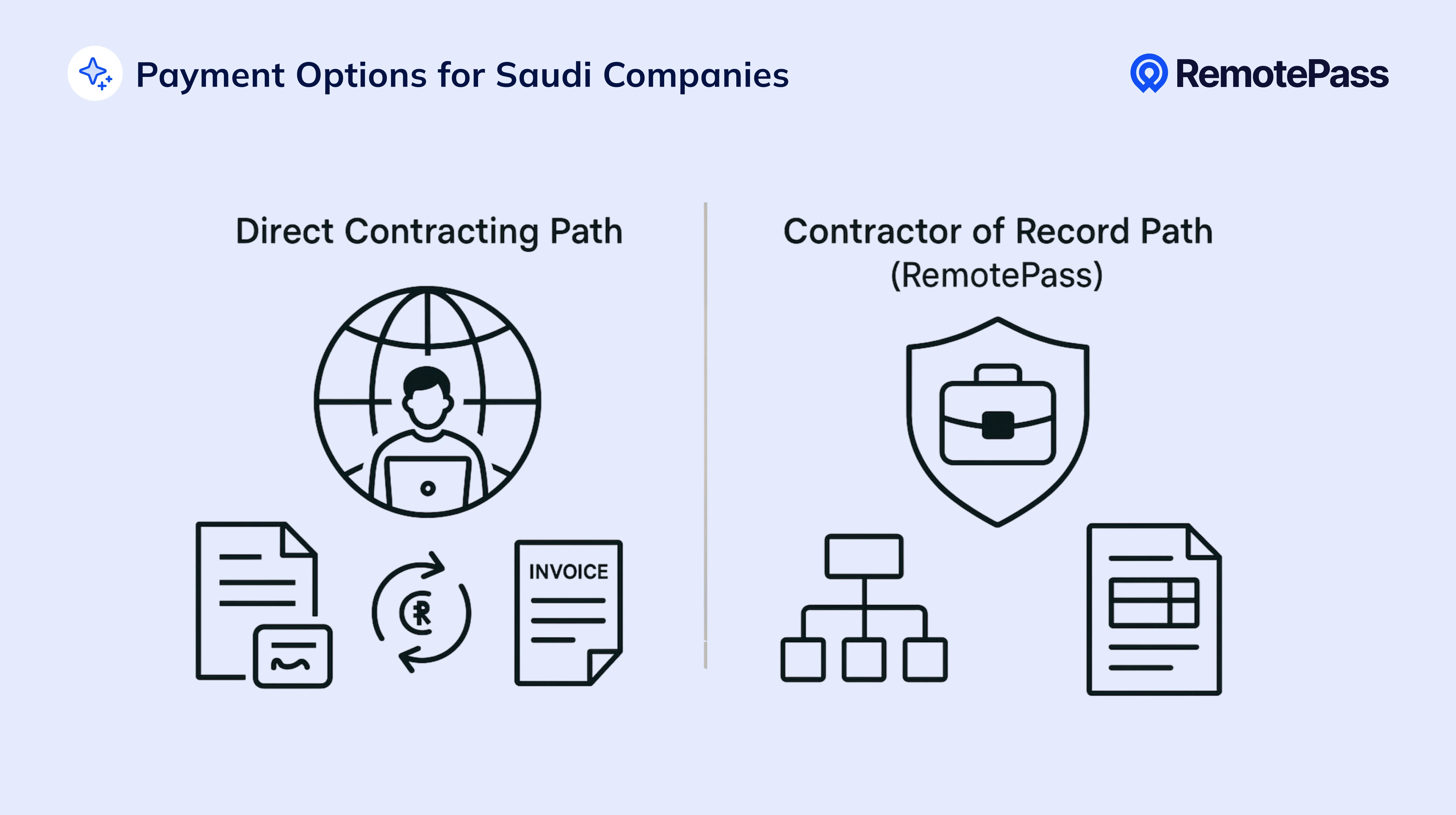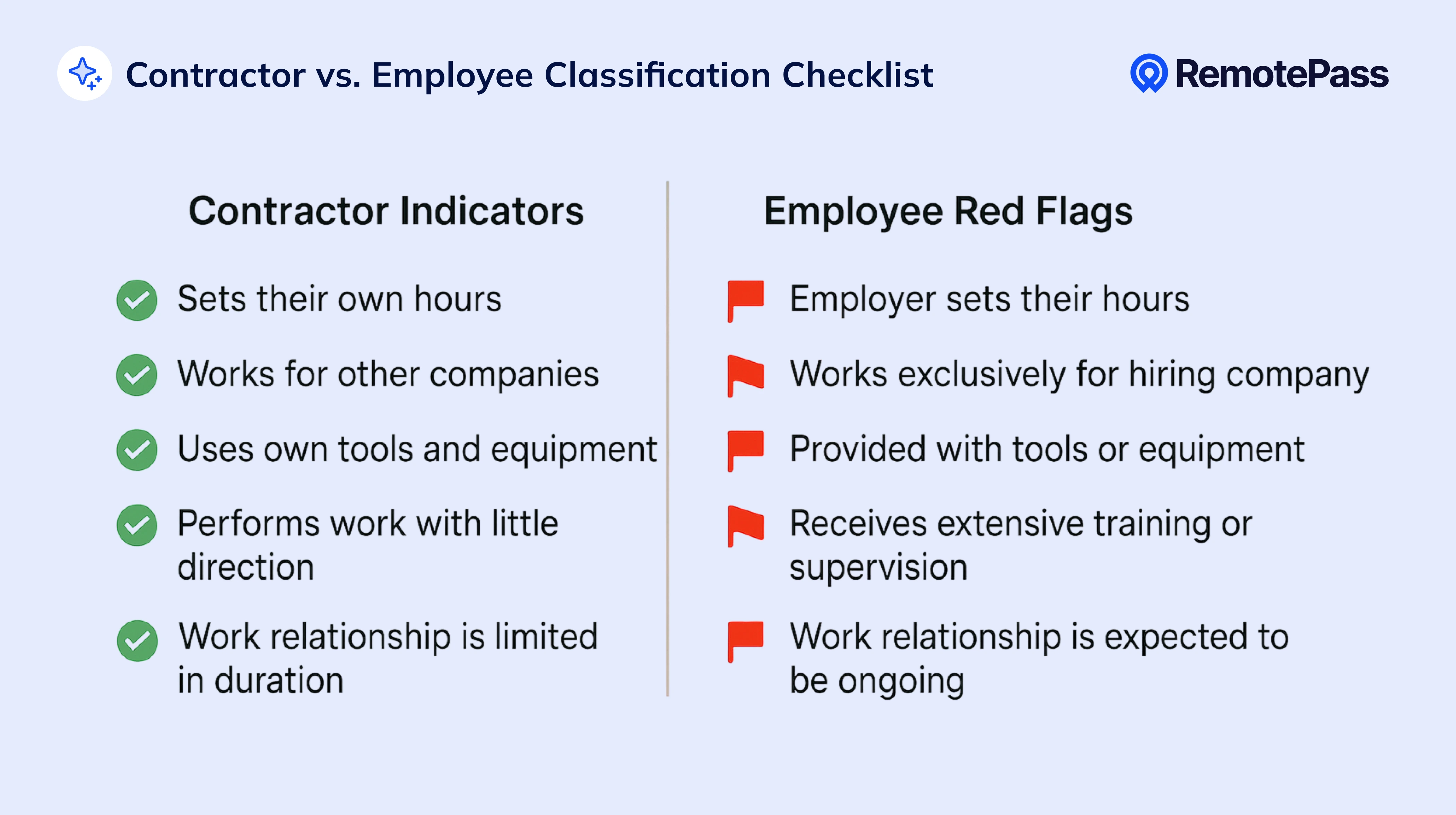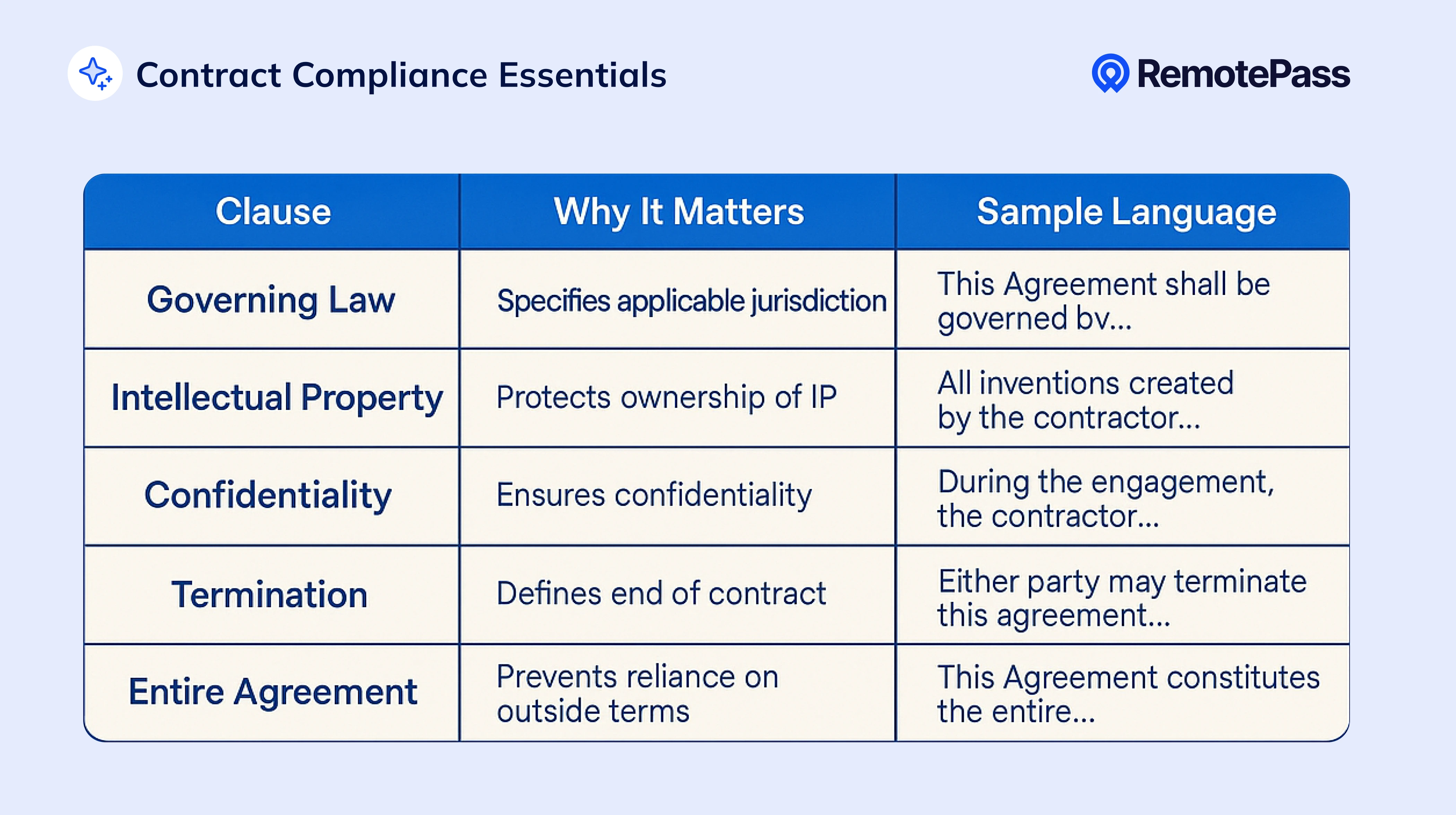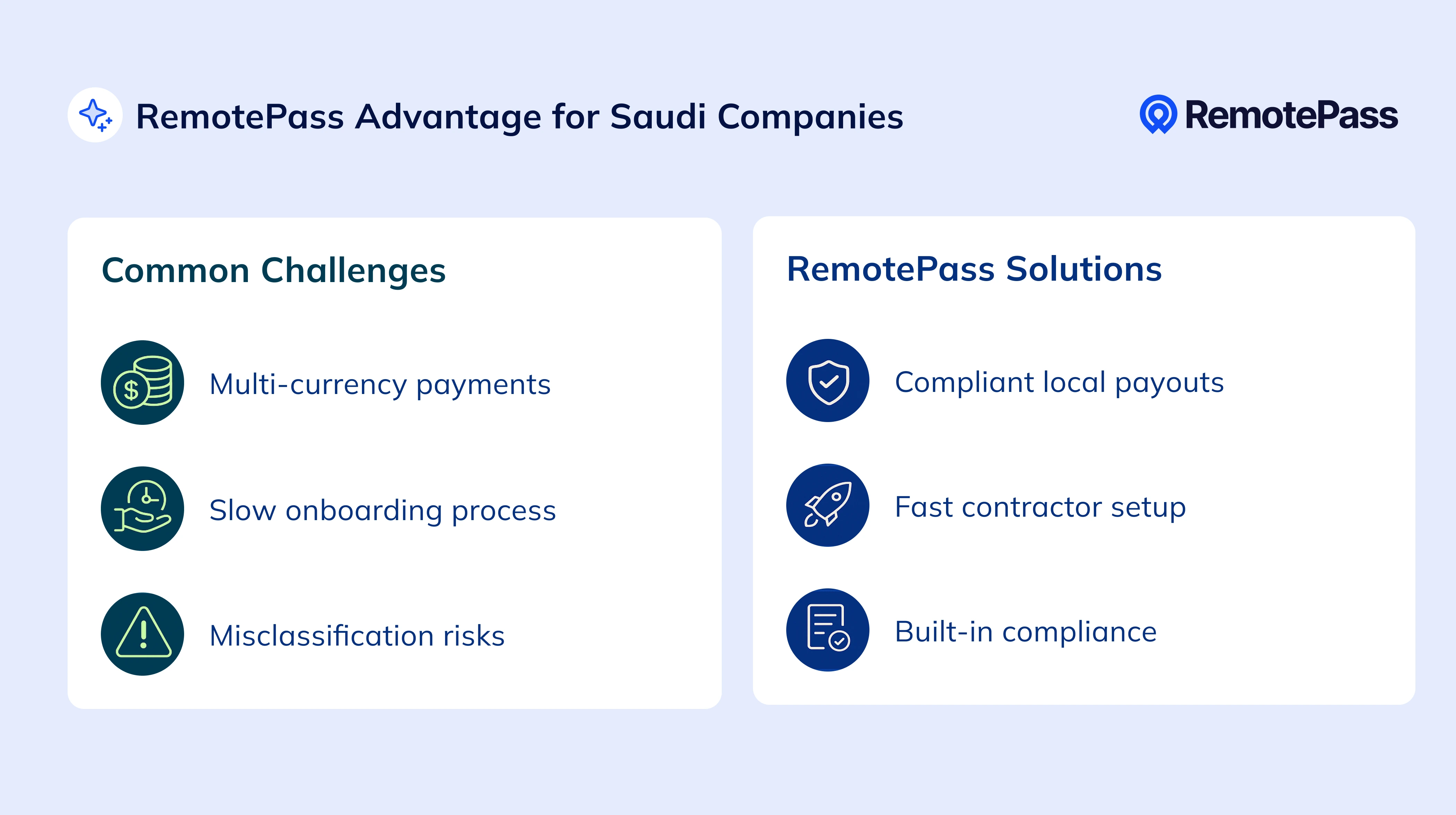As Saudi companies push global expansion under Vision 2030, cross-border work is on the rise. Freelancing in the Kingdom grew by 157% between 2020 and 2023 showing how fast remote and cross-border work is now the norm.
But there’s a catch: compliance. Saudi Arabia’s tax and banking systems are fully digitized, meaning every international payment is traceable. A misstep could expose your business to audits, fines, or reputational risks.
This guide explains how Saudi companies can pay international contractors the right way. You’ll learn the legal paths available, what to avoid, and how a solution like RemotePass can simplify compliance across borders.
Can Saudi Companies Legally Pay Foreign Contractors?
Yes, but only if you follow the correct path. Saudi businesses have two compliant paths for paying international contractors:
1. Direct Contracting as a Service Provider
You can contract directly with freelancers or service providers abroad. These individuals are based in their home countries (Egypt, India, Philippines, etc.), not working inside Saudi Arabia.
The key distinction:
- Allowed: Paying an international contractor working remotely from their country.
- Not allowed: Treating foreign nationals working inside Saudi Arabia as contractors. This violates Saudi labor law.
Requirements:
- Deduct withholding tax on non-resident payments, where applicable.
- Maintain full documentation of services, invoices, and FX conversions.
2. Contractor of Record (CoR)
Here, platforms like RemotePass act as the legal intermediary. They handle compliance, classification, and local rules while you pay one consolidated invoice.
This approach removes classification risks, simplifies administration, and protects your company during audits.
What you cannot do:
Treat contractors like employees without following employment obligations. That means:
- No mandatory office hours.
- No company equipment.
- No exclusivity clauses.
Why this matters: As of January 2024, ZATCA introduced revised audit procedures to detect disguised employment. Misclassification may trigger fines, retroactive benefits, and GOSI contributions.

Key Risks If You Get It Wrong
Saudi regulators don’t leave much room for error. A single misstep in how you pay international contractors can trigger audits, blocked transfers, or even fines.
Here are the biggest compliance risks:
1. ZATCA Documentation & Audit Issues
ZATCA's new Zakat regulation, effective January 1, 2024, introduced revised methodologies for calculating Zakat due and stricter documentation requirements. Your payment may raise red flags if:
- It exceed typical thresholds
- Contractors don’t issue valid invoices
- The payment seems unrelated to your declared business activity
2. Banking & Foreign Exchange Compliance
Saudi banks follow SAMA’s AML (anti-money laundering) rules.International transfers may be delayed or rejected if you don’t provide:
- Valid invoices and service descriptions.
- Contractor business registration details (when possible)
- FX conversion records that justify the transfer amount
3. Misclassification Penalties
The Ministry of Human Resources and Social Development (MHRSD) enforces worker classification rules. Penalties range from SAR 300–8,000 per violation Common triggers include:
- Contractors seeking employee recognition later
- Tax audits that reclassify the relationship
- Recurring payments that resemble disguised salaries
4. Lack of Legal Protection
Without a contract, you lose recourse in disputes. A well-drafted service agreement protects your business and proves the legitimacy of the relationship.
What this Means for You
- ZATCA, SAMA, and MHRSD actively monitor international payments.
- Misclassification and poor documentation create the biggest risks.
- A formal contract and compliant payment method is non-negotiable.

How to Pay International Contractors Without Breaking the Rules
Here’s the legal, low-risk way to pay freelancers abroad from Saudi Arabia.
Step 1: Draft a Legally Valid Contract
Your contract should clearly define:

Pro Tip: Provide Arabic translations when working with MENA contractors, it builds trust and simplifies legal review.
Step 2: Make Sure They’re Actually a Contractor (Not an Employee)
ZATCA and MHRSD don’t care what you call someone; they look at how the relationship works.
Clear signs it’s a contractor:
- They decide how and when to do the work
- They use their own tools
- They work for other clients too
- You pay per project, not per hour
- They take on the financial risk
Red Flags indicating Employee Status:
- You control their daily schedule
- You provide all their equipment
- They can’t work for others
- You pay them a regular salary
- They appear on your org chart or internal systems
When in doubt: Using RemotePass's Contractor of Record removes the guesswork. It handles classification, documentation, and protects you if questions come up later.
Step 3: Pick a Payment Method That Won’t Get Flagged
Choose a method that meets ZATCA and SAMA standards because “fast and cheap” isn’t worth the risk.
What works:
- Bank transfers via licensed Saudi banks which include detailed invoices
- Keep proof of FX conversions
- Use proper service descriptions
International platforms (e.g., Wise, Payoneer)
- Ensure they leave an invoice trail
- Check they’re compliant with Saudi AML regulations
- Document fees and exchange rates
Contractor management platforms like RemotePass
- Local payout rails
- Auto-generated invoices
- Built-in compliance workflows
- Include detailed invoices and service descriptions
- Maintain foreign exchange documentation for ZATCA compliance
- Use established correspondent banking relationships
What to Avoid
Informal remittance systems:
- Hawala or informal money transfer networks
- Personal account transfers without business documentation
- Cash payments or hand-carried funds
Real-world scenario: A Riyadh-based e-commerce company hired a graphic designer in Cairo through a freelance marketplace. They initially tried to pay via personal PayPal transfer to save on fees. When ZATCA audited their marketing expenses, they couldn't provide proper business documentation for the payment, leading to complications and additional scrutiny of their international transactions.
Step 4: Report Payments Correctly
This is where most companies get lazy, and it costs them during audits. Make sure you collect:
- Detailed invoices for every payment
- FX documentation showing conversion rates
- Proof of deliverable completion
- Service descriptions that match your business activity
- Contractor business registration (where applicable)
Pro tip: ZATCA auditors are trained to spot vague, undocumented international payments. Don’t give them a reason to dig deeper.
Why Saudi Companies Use RemotePass to Pay International Contractors (Legally)?
With payouts in 90+ currencies across 150+ countries, RemotePass ensures Saudi businesses stay compliant while paying contractors quickly.
What Makes it Work for Saudi Companies?
- ZATCA-compliant invoices, automated each cycle.
- Transparent FX rates and real-time tracking.
- Local payout rails reducing contractor fees.
- Arabic-language support tailored to Saudi regulations.
- Service delivery confirmation and milestone tracking

Visual comparison of two payment methods for international contractors: Direct Contracting Path and Contractor of Record Path with icons representing invoicing, legal structures, and compliance.
What About Classification?
RemotePass offers a Contractor of Record (CoR) solution that handles it for you. Here is how it helps:
- Eliminates misclassification risks: contractors are legally engaged through RemotePass
- Provides Saudi-compliant contracts: built with GOSI and labor laws in mind
- Ensures GOSI/ZATCA documentation is audit-ready: with invoices, contracts, and payment logs ready for ZATCA
Real-World Example: Hiring a Video Editor in the Philippines
Scenario: A marketing agency in Riyadh wants to hire a video editor in Manila for ongoing social media content creation.
RemotePass Workflow:
- Video editor onboarded with business docs and tax info.
- RemotePass generates a compliant service agreement.
- Deliverables submitted via platform.
- Monthly payment in PHP via local bank transfer.
- All invoices, FX records, and approvals stored for ZATCA audit readiness.
Result: The agency maintains full operational control while RemotePass handles all legal, financial, and compliance aspects. Total setup time: 48 hours instead of weeks of legal documentation and banking setup.
Compliance Checklist for Saudi Companies
Pre-Engagement
- Draft service agreement.
- Verify contractor credentials.
- Set up a compliant payment method.
- Define invoicing/documentation process.
Ongoing Management
- Maintain ZATCA-ready documentation.
- Monitor for misclassification risks.
- Keep FX conversion records.
- Stay updated on regulatory changes.
Offboarding
- Confirm contract end date and deliverables.
- Collect final invoice and process compliant payment.
- Deduct and remit withholding tax if required.
- Revoke system and data access immediately.
- Securely store records per ZATCA and PDPL rules.
Red Lines, Never to Cross
❌ No informal payment channels.
❌ Don’t treat contractors as employees.
❌ Don’t skip documentation.
❌ Don’t ignore banking compliance.
Red Lines Never to Cross (Offboarding Edition)
❌ Don’t release final payment before settling tax obligations.
❌ Don’t leave active credentials or shared access open.
❌ Don’t delete records before required retention period.
❌ Don’t transfer personal data without PDPL safeguards.
Tap Global Talent Without Compliance Risks
Saudi Arabia’s business environment is evolving fast and companies that master international hiring will gain a serious advantage. The line between smooth global growth and a compliance nightmare? It starts with how you pay.
With RemotePass, you can:
- Pay contractors in local currencies.
- Stay fully compliant with ZATCA and SAMA.
- Avoid misclassification penalties.
- Scale international hiring in days, not weeks.
Ready to pay international contractors safely? Book a demo and see how easy compliant contractor payments can be.

.svg)








.svg)
























_EasiestToDoBusinessWith_EaseOfDoingBusinessWith%20(1).svg)





.svg)












